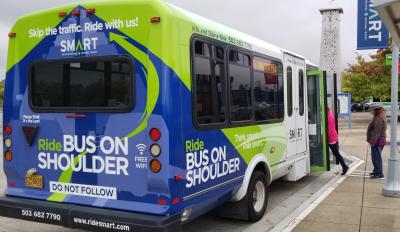ODOT, SMART Host Oct. 26 “Bus on Shoulder” Pilot Project Kick-Off Event
October 14, 2021 — The Oregon Department of Transportation (ODOT) and South Metro Area Regional Transit (SMART) are hosting a public Bus on Shoulder pilot project kickoff event outdoors at the Wilsonville Transit Center (9699 SW Barber St.) on Tuesday, Oct. 26, 12-1 pm,
Featured speakers included ODOT Director Kris Strickler, Wilsonville Mayor Julie Fitzgerald, Tualatin Mayor Frank Bubenik and SMART/Wilsonville’s representatives to Metro’s transportation committee, including Clackamas County Commissioner Paul Savas and Milwaukie City Council President Kathy Hyzy. SMART Director Dwight Brashear serves as event emcee.
After brief remarks from featured speakers, attendees may board a SMART bus for a demonstration Bus on Shoulder ride, accompanied by a contingent of ODOT pilot support vehicles. Per Federal Transit Administration (FTA) rules, face masks are required on board. For more information, visit RideSMART.com/BusOnShoulder.
With operations funded primarily by Wilsonville businesses and new bus acquisitions by FTA and ODOT grants, SMART seeks to provide top-quality, reliable public transit service that enhances rider and commuter mobility.
The “Bus on Shoulder” collaboration with ODOT is a one-year pilot project that authorizes SMART’s free 2X Route express buses to and from the Tualatin Park & Ride to use the highway shoulder in clearly marked areas when highway traffic drops below 35 mph.
Bus on Shoulder offers transit users a mobility advantage when heavy traffic congestion occurs at peak rush-hour commute times. The new service may incentivize new commuters to consider public transit with free WiFi as a viable, low-stress alternative to driving.
The project serves as a prototype for east-west cross-regional transit service being studied by ODOT along I-205 between the employment centers of Tualatin/Wilsonville and the Clackamas Town Center area. Currently, this area of the metro region is unserved by any cross-regional transit service.
Bus on Shoulder is a low-cost, multi-modal transportation solution used successfully throughout the country to addressing congestion safely and cost-efficiently. Regionally, in Clark County, Wash., public transportation agency C-TRAN uses Bus on Shoulder on southbound I-5 between 99th Street and the Interstate Bridge in Vancouver, and on both directions of I-205 on the Glenn Jackson Bridge between State Route 14 in Vancouver and Airport Way in Portland.
ODOT’s goals for this pilot are to create a more reliable transit commute and promote improved transit accessibility, while reducing greenhouse gas emissions. With less time on the road, vehicles release fewer emissions, improving the community’s air quality.
With small, but clear adjustments to road striping and other signage, Bus on Shoulder supports more efficient travel on Oregon’s freeways without large, costly infrastructure improvements that can take years to be realized. This Bus on Shoulder pilot project maximizes use of existing transportation infrastructure and planned highway maintenance, reducing the needed resources for implementation. SMART's experienced and highly-trained drivers are undertaking additional training to support safe and efficient travel in the corridor.
In the designated two-mile stretch of I-5, between the I-205 interchange and Elligsen Rd., buses traveling in both directions may merge onto the shoulder when speeds drop below 35 mph. Buses may drive up to 15 miles per hour faster than highway traffic, up to a maximum speed of 35 mph.
SMART is the only authorized transit provider to use the shoulder for this pilot project. Cars, trucks and other non-emergency vehicles must remain in the designated highway lanes, and are not permitted to use the shoulder unless it’s an emergency, to avoid large highway debris, or to make room for a passing emergency vehicle.
Emergencies take priority over buses. Transit operators are required to yield the shoulder to all emergency vehicles and to merge back into the main traffic lanes. Bus operators encountering an emergency will report back to dispatch so that subsequent operators on those routes are made aware of the obstructions ahead of time.
For more information, contact Dwight Brashear, Transit Director, at 503-570-1576 or brashear@ridesmart.com.
# # #





